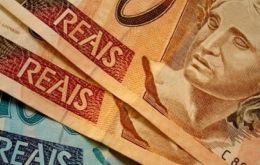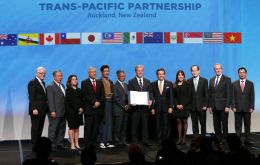MercoPress. South Atlantic News Agency
Economy
-
Friday, February 5th 2016 - 08:27 UTC
Recession biting in Brazil: record net savings withdrawals in January

Net savings withdrawals in Brazil rose to a record high in January, with deposit outflows exceeding inflows by 12.03 billion Reais (some $3.09 billion), the Central Bank said Thursday.
-
Friday, February 5th 2016 - 08:22 UTC
Strong support message from S&Ps for Argentina's economic reforms

Standard & Poor's ratings agency says that Argentina’s new administration has presented a credible plan to deal with long-standing macroeconomic imbalances, eliminated foreign-exchange restrictions, and begun negotiations with its holdout creditors. The outlook on the local currency rating is stable, reflecting the new economic policies of the Administration, but also the potential difficulties in passing and implementing those plans.
-
Friday, February 5th 2016 - 07:54 UTC
Swiss Syngenta accepts takeover proposal by China Chemical: US$ 43bn cash

Government-owned agrochemical firm China National Chemical announced this week an all-cash proposal to buy Swiss rival Syngenta for $43 billion in a deal expected to improve China's food production.
-
Thursday, February 4th 2016 - 08:17 UTC
Magallanes region in south Chile could hold a treasure of unconventional tight gas

The U.S. Geological Survey estimates that the Glauconitica zone of Chile's southernmost Magallanes region holds nearly 8.3 trillion cubic feet of technically recoverable, unconventional tight gas, or nearly double Chile's production of that fossil fuel over the past 70 years.
-
Thursday, February 4th 2016 - 07:45 UTC
Trans Pacific Partnership trade deal signed by 12 member nations in New Zealand

The Trans Pacific Partnership, one of the biggest multinational trade deals ever, has been signed by ministers from its 12 member nations in New Zealand. The ceremony in Auckland brings the huge trade pact, which has been five years in the making, another step towards to becoming a reality. But the TPP continues to face opposition.
-
Wednesday, February 3rd 2016 - 07:23 UTC
Argentina agrees to pay Italian bond holders including “a reasonable interest”

Argentina announced Tuesday that it reached a $900 million preliminary accord to settle its pending debt with 50,000 Italian holders of defaulted Argentine government bonds. Finance minister Alfonso Prat-Gay said that the agreement with Italian bondholders includes the Argentine government's acknowledgement of the debt “and reasonable interest”.
-
Wednesday, February 3rd 2016 - 06:55 UTC
Brazil factories and mine production plunges 8.3% in 2015, with little prospects of change in the short term

Industrial output in Brazil fell for a seventh straight month in December, capping the worst year for manufacturers in more than a decade as they struggle with inflation, high interest rates and political uncertainty.
-
Wednesday, February 3rd 2016 - 06:15 UTC
Brazil airline shares soar as regulator admits opening to foreign capital

Brazilian airline shares soared nearly 30% on Monday after a newspaper report said the government may scrap limits on foreign ownership of domestic airlines to attract investment to the struggling sector. President Dilma Rousseff may propose legislation giving her discretion to let foreign groups own as much as 100% of local airlines, up from 20%, Valor Econômico reported.
-
Wednesday, February 3rd 2016 - 05:38 UTC
BP reported its biggest annual lost and announced 7.000 job cuts

BP slumped to its biggest annual loss last year and announced thousands more job cuts on Tuesday, showing that even one of the nimblest oil producers is struggling in the worst market downturn in over a decade.
-
Tuesday, February 2nd 2016 - 12:07 UTC
Havana Club rum war: Bacardi appeals US decision to let Cuba have the trademark

Bacardi filed suit on Monday against the United States demanding an explanation of its decision to let Cuba sell Havana Club rum in the United States once the U.S. trade embargo against the Castro brothers' island is lifted.
